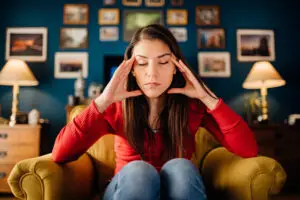Many individuals use the term anxiety to refer to a great deal of worry. But what does anxiety really mean? And what does anxiety look like? Awareness of anxiety symptoms and treatments can increase the likelihood of getting help and relieving any stress you may be feeling.
What is Anxiety?
Anxiety means an excessive worry or anxiousness that lasts for more than six months. The fear and worriedness manifest themselves in various extreme forms. These forms could look like physical and emotional ailments or psychological unrest. The toll that anxiety takes on an individual is very severe. For many individuals, it may not seem clear or evident that he or she is experiencing an anxiety disorder due to the lack of knowledge and information about its manifestation (anxiety.org).
Research suggests that women are more likely to develop an anxiety disorder in their lifetime than men (McLean, 2011, pp. 1). Gender differences and anxiety has shown that the manifestation of anxiety in both women and men could be presented in a similar fashion. However, research suggests that the main difference is “the observed differences between men and women are somewhat influenced by gender-related differences in the conceptualization and reporting of symptoms” (McLean, 2011, pp. 11).
Common Anxiety SymptomsAnxiety Symptoms and Treatments
Anxiety’s most common psychological symptoms are: excessive worriedness, nervousness, irritation, racing thoughts, and a sense of panic. On the other hand, anxiety could take a much more physiological form in certain individuals. These common symptoms are: increased heartbeat, difficulty sleeping or remaining asleep, loss of appetite, tense muscles, and sweating. “These shared physiological states suggest a shared underlying biology and that anxiety maybe a whole-body condition” (Jovanovic, et al., 2018).
Treatment for anxiety could include various options. When combined, evidence-based therapy (EBT), cotemporary and alternative therapies have been shown effectiveness in the treatment of anxiety. Cognitive-behavioral therapy is an example of one type of EBT. “It teaches people different ways of thinking, behaving, and reacting to anxiety-producing and fearful objects and situations. CBT can also help people learn and practice social skills, which is vital for treating social anxiety disorder.” Typically, some therapies are combined to increase their effectiveness in treating anxiety. CBT and exposure therapy have been utilized quite a bit together to treat social anxiety disorder (SAD) (NIMH, 2018).
Another form of treatment for anxiety disorders that has been researched intensively is the use of medical marijuana. The research that has been complied thus far suggests that medical marijuana is capable of reducing anxiety, relaxing muscle tension, and stimulating appetite (Lava, 2018). Pennsylvania is one of the 33 states that has legalized the medical use of marijuana, “short-term use of medical marijuana with low THC and high CBD content has been shown to be most effective in treatment of anxiety disorders” (Sasko, 2019).
How Can We Help? Anxiety Symptoms and Treatments
Rahmah Albugani is a doctorate intern who is conducting evaluations and ongoing counseling here at Makin Wellness. She is a nationally certified counselor with experience in setting goals for clients that are specific, measurable, achievable, realistic and time manageable. If you are interested in mental health counseling for anxiety, please contact our office at (412)-532-1249 to schedule with Rahmah!

NCC, Professional Counselor
Makin Wellness
—
About Makin Wellness
Founded in 2017 , Makin Wellness is Pittsburgh’s premier therapy & coaching centers located in Downtown Pittsburgh and Downtown New Kensington. The company’s mission is to help people heal and become happy again. Makin Wellness specializes in depression, anxiety, addiction, trauma, medical marijuana assisted treatment and relationship counseling.








